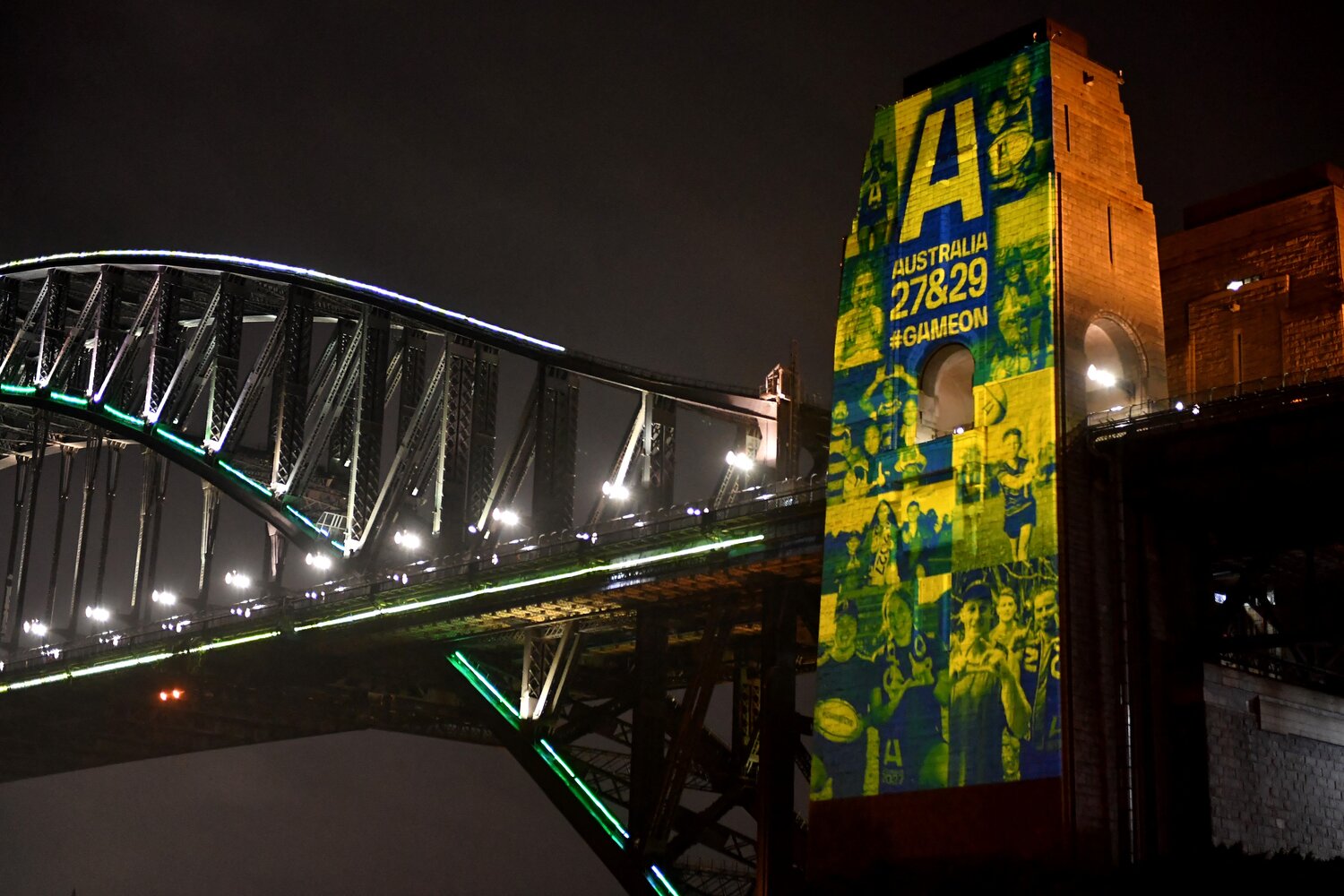The USA would be the weakest team to ever host the World Cup and they still only attract around 20,000 people to their home matches.

The Harbour Bridge is lit up to mark the final day of Australia’s campaign to host the men’s and women’s Rugby World Cup in 2027 and 2029, in Sydney. Picture: Saeed Khan / AFP
World Rugby this week confirmed the hosts of their World Cup tournaments for men and women through to 2033 and proved again that, as the governing body for the sport, they are mainly concerned with making as much money as possible and not necessarily the good of the game or sporting principles like fairness and equity.
Of the nine men’s World Cup tournaments held, six have been won by New Zealand and South Africa, and yet they are the countries most unlikely to ever host rugby’s showpiece tournament again, purely for economic reasons.
New Zealand’s small population and time zone issues mean the 2011 tournament they won is likely to be the last one they ever host, while South Africa are mainly prejudiced by their weak economy. Although the exchange rate does make hosting the tournament cheaper, World Rugby still demand a guarantee of about R2 billion from whoever stages a World Cup.
That sort of money can only really be stumped up by northern hemisphere nations and Australia.
But having put on some of the greatest sporting events ever held – Madiba’s 1995 Rugby World Cup at the dawn of democracy, the 2003 Cricket World Cup and the 2010 Football World Cup – there is no denying South African rugby fans feel tremendously hurt at being snubbed by World Rugby.
ALSO READ: World Rugby make five trial laws permanent
That hurt is only made greater by the skullduggery that saw France snatching the hosting rights for next year’s World Cup, after World Rugby’s own evaluation committee had recommended South Africa.
But when it came to the World Rugby council voting on the issue, the powerful European bloc backed France. The worse betrayal of all came from Rugby Africa, the continental body which has its offices in Cape Town, paid for by SA Rugby, and who also voted for France.
Much like in African football, there is a growing sense of north African teams seizing power and aligning themselves with the old colonial power of France.
In a decision World Rugby chairman Bill Beaumont, the former England captain, said would “accelerate the growth and impact of rugby globally”, Australia were awarded the 2027 World Cup and the USA the 2031 edition.
The next three Women’s World Cups (2025, 2029 & 2033) will be hosted by England, Australia and the USA.
Apart from an obvious trend towards favouring the Anglosphere, the USA are hardly a rugby power. Their women may be ranked seventh in the world, but the men’s game is still taking baby steps.
Major League Rugby has been on the go in America since 2017 and the sport is growing in the world’s biggest commercial market. But the USA would be the weakest team to ever host the World Cup and they still only attract around 20,000 people to their home matches.
Sevens rugby is their most popular format, with nine million TV viewers for the Rugby World Cup Sevens in San Francisco in 2018.
One can argue giving Australia a World Cup is also helping the development of the game because rugby union is perpetually fighting a battle for prominence in a country that prefers Aussie Rules and rugby league, especially with the Wallabies slowly drifting away from rock-bottom and their union admitting that hosting the World Cup will basically save them from going bankrupt.
Having been kind enough to help Australia out of their financial hole, one hopes World Rugby will show the same generosity and offer the same opportunities to New Zealand and South Africa, historically the most important rugby nations.
But it will be at least 40 years between World Cups for South Africa, and New Zealand are lagging in the sporting arms race when it comes to the capacity of their stadiums, the size of their population and technological advancement.
Oh, and don’t forget that both these great nations cannot pour enough of that all-important cash into World Rugby’s greedy coffers.





